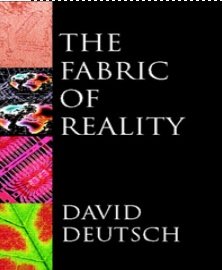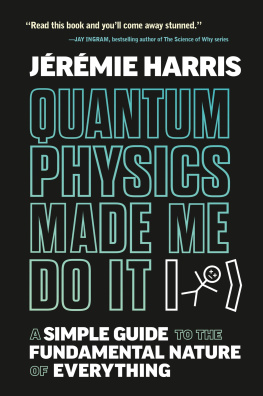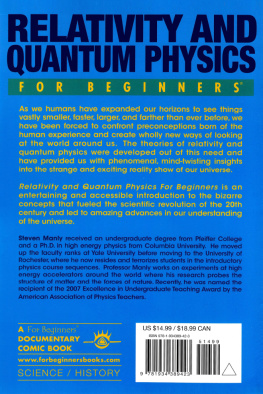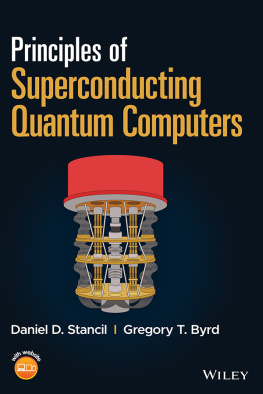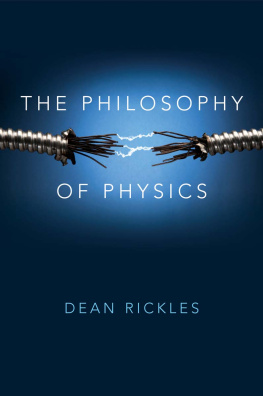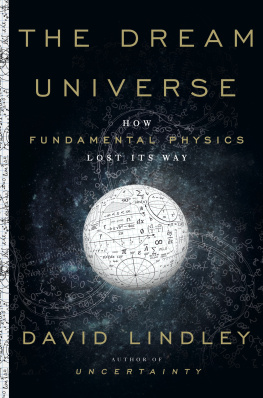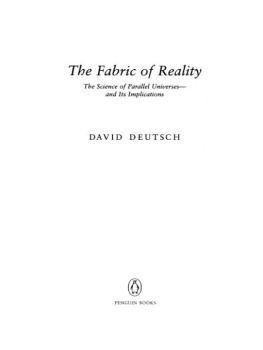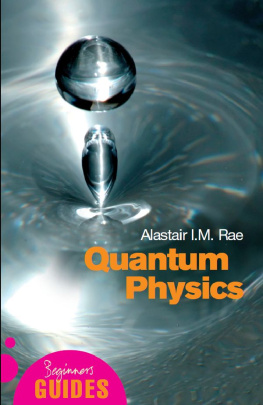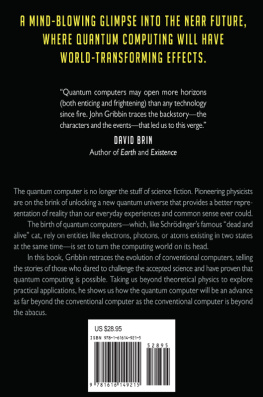David Deutch - The Fabric of Reality
Here you can read online David Deutch - The Fabric of Reality full text of the book (entire story) in english for free. Download pdf and epub, get meaning, cover and reviews about this ebook. genre: Science. Description of the work, (preface) as well as reviews are available. Best literature library LitArk.com created for fans of good reading and offers a wide selection of genres:
Romance novel
Science fiction
Adventure
Detective
Science
History
Home and family
Prose
Art
Politics
Computer
Non-fiction
Religion
Business
Children
Humor
Choose a favorite category and find really read worthwhile books. Enjoy immersion in the world of imagination, feel the emotions of the characters or learn something new for yourself, make an fascinating discovery.
- Book:The Fabric of Reality
- Author:
- Genre:
- ISBN:0-7139-9061-9
- Rating:5 / 5
- Favourites:Add to favourites
- Your mark:
- 100
- 1
- 2
- 3
- 4
- 5
The Fabric of Reality: summary, description and annotation
We offer to read an annotation, description, summary or preface (depends on what the author of the book "The Fabric of Reality" wrote himself). If you haven't found the necessary information about the book — write in the comments, we will try to find it.
The Fabric of Reality — read online for free the complete book (whole text) full work
Below is the text of the book, divided by pages. System saving the place of the last page read, allows you to conveniently read the book "The Fabric of Reality" online for free, without having to search again every time where you left off. Put a bookmark, and you can go to the page where you finished reading at any time.
Font size:
Interval:
Bookmark:
David Deutch
The Fabric of Reality
PENGUIN BOOKS
THE FABRIC OF REALITY
Born in Haifa, Israel, David Deutsch was educated at Cambridge University and Oxford University. He is a member of the Quantum Computation and Cryptography Research Group at the Clarendon Laboratory, Oxford University. His papers on quantum computation laid the foundations for that field, and he is an authority on the theory of parallel universes.
Praise for The Fabric of Reality
Full of refreshingly oblique, provocative insights Quantum mechanics, Deutsch insists, must be taken not just as a predictive tool, but as an explanation for how the world really works.
George Johnson, The New York TimesDavid Deutsch is a deeply knowledgeable professional physicist who has no truck with mystical false analogies [he] has become the most eloquent spokesman of the Many Universes interpretation of quantum behavior, and [The Fabric of Reality] makes this theme coherent with some well-thought-out views of epistemology, of biological evolution, and of the theory of computation.
Richard DawkinsIn the library of physics for laypeople, Deutschs book is unique. Correction: it is multiversal, existing in innumerable universes that Deutsch argues exist alongside the real universe that people perceive. Explaining that, and persuading the reader of its scientific truth, makes this work unique the confidence with which Deutsch presents his views, and the absence of condescension in his style, accesses nonscientists to his seemingly alien world(s).
ALA BooklistDavid Deutsch is one of Britains most original thinkers. In this major work he confronts the deepest questions of existence head on, challenging traditional notions of reality with a new worldview that interweaves physics, biology, computing, and philosophy. I havent been so inspired since I read Douglas Hofstadters Gdel, Escher, Bach.
Paul Davies, author of About Time: Einsteins Unfinished RevolutionDeutsch provides a model of reality that is as provocative as it is complex. An intellectually stimulating read for the science-literate and motivated layperson. The author exhibits a thorough knowledge of his subject matter. In a field where scientific inquiry challenges not only our imagination but basic assumptions about our physical world, this volume provides the essential information needed for future debates.
Publishers WeeklyDedicated to the memory of Karl Popper, Hugh Everett and Alan Turing, and to Richard Dawkins. This book takes their ideas seriously.
Preface
If there is a single motivation for the world-view set out in this book, it is that thanks largely to a succession of extraordinary scientific discoveries, we now possess some extremely deep theories about the structure of reality. If we are to understand the world on more than a superficial level, it must be through those theories and through reason, and not through our preconceptions, received opinion or even common sense. Our best theories are not only truer than common sense, they make far more sense than common sense does. We must take them seriously, not merely as pragmatic foundations for their respective fields but as explanations of the world. And I believe that we can achieve the greatest understanding if we consider them not singly but jointly, for they are inextricably related.
It may seem odd that this suggestion that we should try to form a rational and coherent world-view on the basis of our best, most fundamental theories should be at all novel or controversial. Yet in practice it is. One reason is that each of these theories has, when it is taken seriously, very counter-intuitive implications. Consequently, all sorts of attempts have been made to avoid facing those implications, by making ad hoc modifications or reinterpretations of the theories, or by arbitrarily narrowing their domain of applicability, or simply by using them in practice but drawing no wider conclusions from them. I shall criticize some of these attempts (none of which, I believe, has much merit), but only when this happens to be a convenient way of explaining the theories themselves. For this book is not primarily a defence of these theories: it is an investigation of what the fabric of reality would be like if they were true.
Acknowledgements
The development of the ideas in this book was greatly assisted by conversations with Bryce DeWitt, Artur Ekert, Michael Lockwood, Enrico Rodrigo, Dennis Sciama, Frank Tipler, John Wheeler and Kolya Wolf.
I am grateful to my friends and colleagues Ruth Chang, Artur Ekert, David Johnson-Davies, Michael Lockwood, Enrico Rodrigo and Kolya Wolf, to my mother Tikvah Deutsch, and to my editors Caroline Knight and Ravi Mirchandani (of Penguin Books) and John Woodruff, and especially to Sarah Lawrence, for their thorough, critical reading of earlier drafts of this book, and for suggesting many corrections and improvements. I am also grateful to those who have read and commented on parts of the manuscript, including Harvey Brown, Steve Graham, Rossella Lupaccini, Svein Olav Nyberg, Oliver and Harriet Strimpel, and especially Richard Dawkins and Frank Tipler.
1
The Theory of Everything
I remember being told, when I was a small child, that in ancient times it was still possible for a very learned person to know everything that was known. I was also told that nowadays so much is known that no one could conceivably learn more than a tiny fraction of it, even in a long lifetime. The latter proposition surprised and disappointed me. In fact, I refused to believe it. I did not know how to justify my disbelief. But I knew that I did not want things to be like that, and I envied the ancient scholars.
It was not that I wanted to memorize all the facts that were listed in the worlds encyclopaedias: on the contrary, I hated memorizing facts. That is not the sense in which I expected it to be possible to know everything that was known. It would not have disappointed me to be told that more publications appear every day than anyone could read in a lifetime, or that there are 600,000 known species of beetle. I had no wish to track the fall of every sparrow. Nor did I imagine that an ancient scholar who supposedly knew everything that was known would have known everything of that sort. I had in mind a more discriminating idea of what should count as being known. By known, I meant understood.
The idea that one person might understand everything that is understood may still seem fantastic, but it is distinctly less fantastic than the idea that one person could memorize every known fact. For example, no one could possibly memorize all known observational data on even so narrow a subject as the motions of the planets, but many astronomers understand those motions to the full extent that they are understood. This is possible because understanding does not depend on knowing a lot of facts as such, but on having the right concepts, explanations and theories. One comparatively simple and comprehensible theory can cover an infinity of indigestible facts. Our best theory of planetary motions is Einsteins general theory of relativity, which early in the twentieth century superseded Newtons theories of gravity and motion. It correctly predicts, in principle, not only all planetary motions but also all other effects of gravity to the limits of accuracy of our best measurements. For a theory to predict something in principle means that the predictions follow logically from the theory, even if in practice the amount of computation that would be needed to generate some of the predictions is too large to be technologically feasible, or even too large for it to be physically possible for us to carry it out in the universe as we find it.
Font size:
Interval:
Bookmark:
Similar books «The Fabric of Reality»
Look at similar books to The Fabric of Reality. We have selected literature similar in name and meaning in the hope of providing readers with more options to find new, interesting, not yet read works.
Discussion, reviews of the book The Fabric of Reality and just readers' own opinions. Leave your comments, write what you think about the work, its meaning or the main characters. Specify what exactly you liked and what you didn't like, and why you think so.

